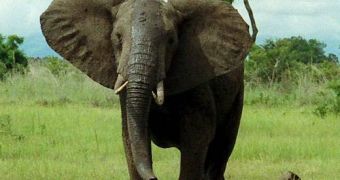Mike Holding, a wildlife cameraman filming a documentary for the BBC in northern Botswana, came across one of the rarest sights in the animal world – a pink elephant. The cub, which was hiding under its mother for protection, was only sighted for a few moments, but the journalist managed to get a few snapshots of the odd-looking creature.
The rare animal is part of an 80-strong herd living in the Okavango Delta, and is believed to be an albino. Though cases of lack of pigmentation in animals are extremely rare, wildlife experts have seen such elephants before. In addition, only recently a pink dolphin was discovered in the United States, and it too was suspected of being an albino.
“We only saw it for a couple of minutes as the herd crossed the river. This was a really exciting moment for everyone in camp. We knew it was a rare sighting – no-one could believe their eyes," Holding told the BBC, with which it shared the pictures. While human albinos are completely white (hence the name), in animals the situation is a bit different. Dolphins tend to get a beautiful pink color, while elephants get a brownish tint. In some cases, however, even the large mammals turn pink.
Still, despite it being one of the rarest occurrences in the world, the calf is at danger, experts say, mostly because the intense heat in the African landscape can cause the small creature's skin to burn and its eyes to go blind on account of the bright sun.
“I have only come across three references to albino calves, which have occurred in Kruger National Park in South Africa. This is probably the first documented sighting of an albino elephant in northern Botswana. We have been studying elephants in the region for nearly 10 years now, and this is the first documented evidence of an albino calf that I have come across,” the leader of the Elephants Without Borders conservation charity, ecologist Dr Mike Chase, shared.
“What happens to these young albino calves remains a mystery. Surviving this very rare phenomenon is very difficult in the harsh African bush. The glaring sun may cause blindness and skin problems. Because this elephant calf was sighted in the Okavango Delta, he may have a greater chance of survival. He can seek refuge under the large trees and cake himself in a thick mud, which will protect him from the Sun,” he told the BBC.
“Already the two-to-three-month-old calf seems to be walking in the shade of its mother. This behavior suggests it is aware of its susceptibility to the harsh African sun, and adapted a unique behavior to improve its chances of survival. I have learned that elephants are highly adaptable, intelligent and masters of survival,” the expert concluded, saying that there might still be some hope for the odd elephant after all.

 14 DAY TRIAL //
14 DAY TRIAL //